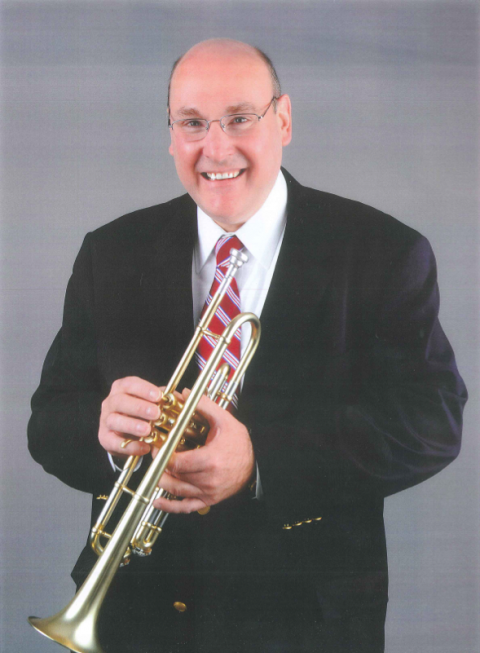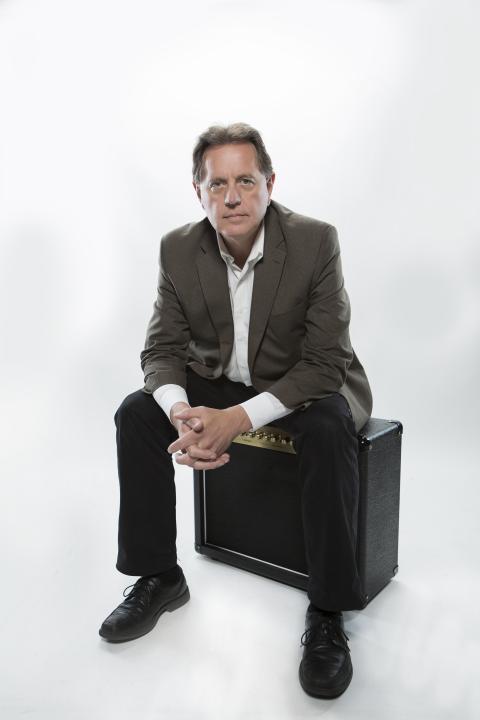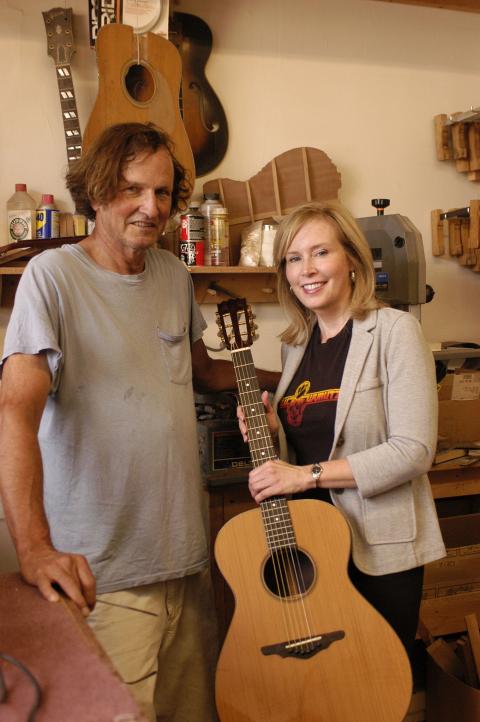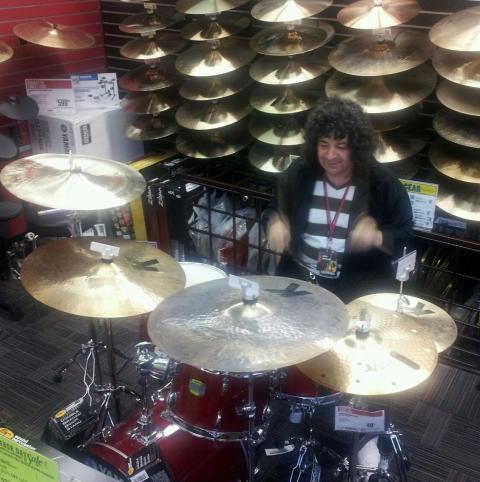Gearing Up for the Dream

Lee Walkowich ’81
For decades, dedicated music retailers located in the Berklee neighborhood have offered musical gear and career opportunities to students and alumni.
Anyone with a business sense could deduce that the blocks in Boston’s Back Bay area where two conservatories and Berklee are located hold promise for music retail shops. As Berklee began experiencing exponential growth starting in the 1960s, retailers supplying instruments, amps, audio gear, strings, drumsticks, trombone mouthpieces, saxophone reeds, and more flocked to the area. At one point, business from local musicians as well as nationally recognized artists passing through the neighborhood supported Jack’s Drum Shop, E.U. Wurlitzer Music and Sound, Cambridge Music, Daddy’s Junky Music, and Rayburn Musical Instrument Company (a few blocks away on Huntington Avenue).
For the first time in decades, by 2011, there was no big-box retailer located in the center of the Berklee campus. In October of that year, Daddy’s Junky Music at 161 Massachusetts Avenue closed its doors. Happily, for musicians, Guitar Center opened a store in the same spot a year later, and business resumed.
In addition to supplying the day-to-day needs of musicians, these stores have also been significant training grounds for Berklee alumni and students employed there who plotted career paths in various sectors of the music products industry. What follows is a look at a handful of alumni who got their start in these beloved stores in Berklee’s neighborhood.
The Early Days
In 1939, Rayburn Musical Instrument Company opened up shop. During the late 1940s, it served those attending Lawrence Berk’s Schillinger House (which was later renamed Berklee) in the late 1940s as well as today’s students. While the store changed ownership and moved across Huntington Avenue to a new site in recent years, one constant for the past four decades has been Rayburn’s legendary repairman Emilio Lyons. Dubbed the “Sax and Clarinet Doctor,” Now an octogenarian, Lyons still works there two days a week. Through the years, his customers have included sax superstars spanning the generations from Illinois Jacquet to Wayne Shorter to Michael Brecker to Kenny Garrett.
Trumpet player Lee Walkowich ’81, who earned his Berklee degree as a professional music major, entered the music retail business and ultimately worked at Rayburn for 15 years. “I was playing gigs with the Artie Barsamian’s big band, and decided I needed a day job too,” Walkowich recalls. “I started working at Boston Music Company down on Boylston Street near the theater district in 1981 and eventually became the store manager.” Walkowich stayed for nine years until being lured away by the late David Ginott (then the owner of Rayburn), in 1990.
Ginott enlisted Walkowich to help him realize his vision for the store. “We built the brass department into one of the finest in the world,” Walkowich recalls. “We had the high-end stuff—custom-made horns and mouthpieces—you name it, we had it. Our customers were some of the finest players in the world. Sonny Rollins, Zoot Sims, Arturo Sandoval, and many major symphony players from around the world used to shop there. Walkowich recalls the patronage of Berklee musicians in the development and success of that store. “We made a lot of international contacts through the Berklee students.”
Walkowich learned the ropes during his years at Rayburn. “Emilio taught me so much about the art of the deal and how to work with the public,” he says. “He taught good common-sense practices and integrity. In my book, he’s a star.”
After Ginott passed away in 2003, Walkowich stayed on for two more years. “A lot of other retailers around the country were watching to see what would happen next at Rayburn,” Walkowich says. Alan Levin from Washington Music Center, located just outside Washington, D.C., called and offered him a job in 2005.
“I relocated to Washington and have never regretted the move,” he says. “This is a huge store, and I manage the band and orchestra room here. We sell to military bands, Broadway musicians, L.A. studio players, and orchestral players. We have an $8 million inventory in stock. It’s somewhat of a unique institution.”
Looking back, Walkowich says, “This industry has been good to me. I wanted a good day job that would allow me to play gigs on weekends, and I discovered that I had an aptitude for the music retail business. It’s a great industry. I’ve loved being involved with musicians and product development. Overall, I’ve enjoyed just helping people out.”
Drum Roll
During the mid-1940s, Jack Adams opened up Jack’s Drum Shop on Stuart Street. Jack’s still operates today making it perhaps the oldest ongoing drum store in the nation. Adams transferred ownership of the store to a family member who during the late 1960s relocated the store half a block from Berklee’s 1140 Boylston Street building. In 1975, Ken Yetman, a former employee, purchased the business. The store became a mecca for students and noted professional drummers alike and stocked brand name drum sets, accessories, and all manner of exotic and ethnic percussion instruments. For years, the store supplied Berklee’s African percussion students with frame drums and also carried the line of percussion instruments created by world percussionist and former faculty member Jamey Haddad.
Yetman opened a second store on Main Street in Hyannis in 1988. He closed the Boylston Street location 20 years later and now only operates the Hyannis store. “We decided to wind things down a bit,” says Yetman. “But we had a good run for 33 years on the block by Berklee.”
The Store on the Corner

Gene Joly ’73
Guitarist Gene Joly ’73 took a job at E.U. Wurlitzer as a warehouse manager in 1975. “I was serious about playing in bands and thought it would be a temporary job,” he says. “But after getting married and starting a family, I got serious about having a steady income. I’m still in this industry 38 years later.”
Having spent 21 years at Wurlitzer, Joly is an authority on the store’s history. “As the story goes,” he says, “the Wurlitzer family opened the store in the 1920s as an instrument repair shop. They later began selling horns and Martin guitars. The late Tim Jachrimo joined the company in the 1950s. He had an intellectual curiosity about technology and new instruments.”
Joly says that when the first Fender sales rep showed up with a Fender Precision bass in the 50s, Pop Wurlitzer threw him out of the store. Jachrimo chased the rep down the street and told him to come back after Pop left at 5:00 p.m. “Tim was responsible for bringing the Fender and Ampeg lines to the store,” Joly says. “So when the big boom in electric instruments hit in the sixties, Wurlitzer was well positioned.”
In 1970, Jachrimo, who was then the store manager, he moved it from cramped quarters on Bedford Street to a larger space at 360 Newbury Street near Berklee. The new facility allowed more inventory and individual instrument departments. Bob Cavanaugh (now 90 years old) expertly managed the guitar department in one of the most guitar-centric areas of the country. He has countless anecdotes about waiting on George Benson, Wes Montgomery, Pat Metheny, Mick Goodrick, and others during his 20-year tenure. Cavanaugh also gets kudos for tipping off Bill Leavitt to Berklee’s search for a guitar chair in the college’s then-fledgling guitar department.
Around 1982, the Wurlitzer family sold the store to a new owner. There were signs of financial problems. Joly was named president of the store in 1983 and helped the company weather the storm. Within a few years, Joly and company had righted the ship, and the store was doing well.
During the mid-1980s, Beverly Tryon ’82, spent three years working at Wurlitzer. “I came to Berklee to study guitar,” Tryon says, “but I figured out that I didn’t want a career as a performer. Not long after Berklee, I was inspired by the great guitar builders Jimmy D’Aquisto and Linda Manzer and enrolled in a guitar-building course in Vermont.” During the six-week course, Tryon built a fine acoustic guitar, and subsequently repaired guitars in Connecticut before taking a job at E.U. Wurlitzer in Boston.

Beverly Tryon ’82 and Peter Stokes with a guitar built by Tryon
Adam Renn Olenn
Tryon recalls, “Wurlitzer was in its heyday during the 1970s and early ’80s. It was the top music store in Boston then and was a fun place to work.” Many local rockers who were breaking out nationally came to the store for instrument repairs and to buy equipment. “Peter Wolf of the J. Geils Band, members of the Cars, Boston, and other well-known musicians used to stop by,” she recalls.
After three-plus years at Wurlitzer, Tryon made another career shift. Through her repair work, she met many representatives from the major equipment manufacturers and did some purchasing for Wurlitzer. In 1985, she was hired to work in Berklee’s Purchasing Department. “It was a nice segue,” she says. Today, Tryon is the college’s senior director of institutional advancement. “Few people today know that I started my working career in guitar repair.”
By 1990, LaSalle Music, Wurlitzer’s parent company failed, but Wurlitzer was holding its own. That same year, the lease for the Newbury Street building expired, and the new owner didn’t want a music store for a tenant. “We didn’t leave willingly,” Joly recalls, “that was a fantastic location.
In addition to opening a new Wurlitzer store on Commonwealth Avenue opposite Boston University, the company converted a small warehouse space it was renting at 180 Massachusetts Avenue to a retail space. “We really wanted to maintain a presence in the Berklee neighborhood,” Joly says. He stayed with the company until 1996, when Wurlitzer was operating seven stores in the New England area.
In 1996, Joly left to work for Thoroughbred Music in Tampa, Florida. (Wurlitzer went out of business two years later.) Joly later worked for Tascam before accepting a vice president position at Guitar Center in Southern California in 2002. In September 2013, Joly was named president of Musician’s Friend, a division of Guitar Center.
Looking back, he says, “I was fortunate to work with a lot of knowledgeable people at Wurlitzer. We had a great staff and a lot of them have gone on to develop great careers in the industry.”
At the Center of It All

Hirsh Gardner ’73
Gardner established himself as a record producer and won a Boston music award, among other accolades. “Then my producing took a downturn in the early 1990s,” Gardner says. Fred Bramante, the founder of the Daddy’s Junky Music store chain, offered him a job in music retail. Gardner accepted Bramante’s offer and began a new career track. He worked at the company’s larger stores in New Hampshire, and helped Daddy’s launch a pro-audio line. Gardner was even named salesman of the year. He also started a highly successful used instrument mail order business for Daddy’s. “I remember selling some gear to Joe Perry [of Aerosmith] and [guitarist] Steve Vai.”
In 2000, Bramante asked Gardner to relocate and manage the Boston store at 161 Massachusetts Avenue. By that time, it was the biggest music store in Berklee’s neighborhood. In addition to thousands of Berklee students buying their gear there, many national touring musicians passing through town stopped in. “I remember selling a keyboard to Stevie Wonder,” Gardner says. “Joe Walsh of the Eagles and Eddie Van Halen have also stopped by.”
After experiencing financial problems, the company folded in 2011. Gardner contacted his former competitors at Guitar Center and joined their staff. In 2012, Guitar Center opened its new store at the site that Daddy’s had occupied for many years with Gardner as the store manager. “I really tuned into what the students at Berklee and Boston and New England conservatories needed,” Gardner says. “I wanted the kids to know they could come here and we’d beat the prices they could find by shopping online, and they [would] walk out of the store with the gear.”
The line of brass and woodwind merchandise, an equipment rental division that includes high-end pro audio gear, and other specialty touches, distinguish the Boston store from others in the Guitar Center chain. Gardner has also promoted bonds among the store, the educational community, and local musicians. “We are hosting clinics by Berklee faculty members and have opened our stage up for afternoon performances,” he says. “I wanted to see everyone working together.”
In addition to selling the tools of the musical trade, music retailers in the neighborhood are a great source for a part-time job or a career. “Most of the people working at this store are either Berklee alumni or students,” Gardner says. “A young student called me, saying she was coming to Berklee and that she’d worked at a Guitar Center store in her hometown for two years. That’s all I needed to hear. Without meeting her, I told her there would a job waiting for her when she got to Boston.”




